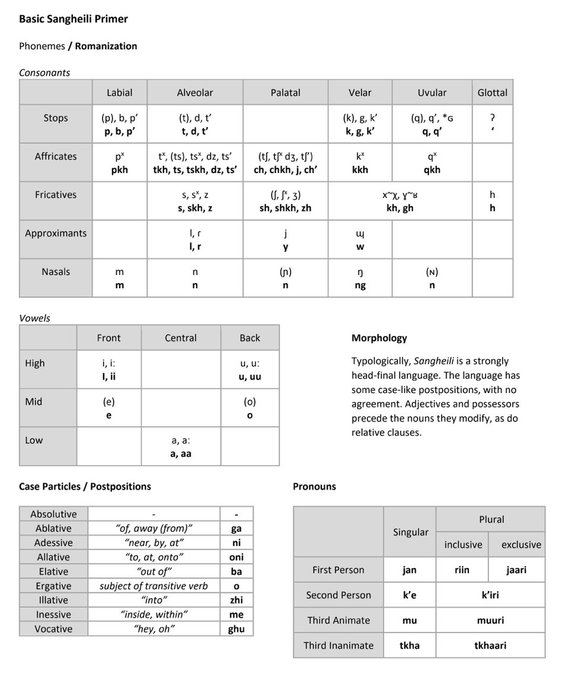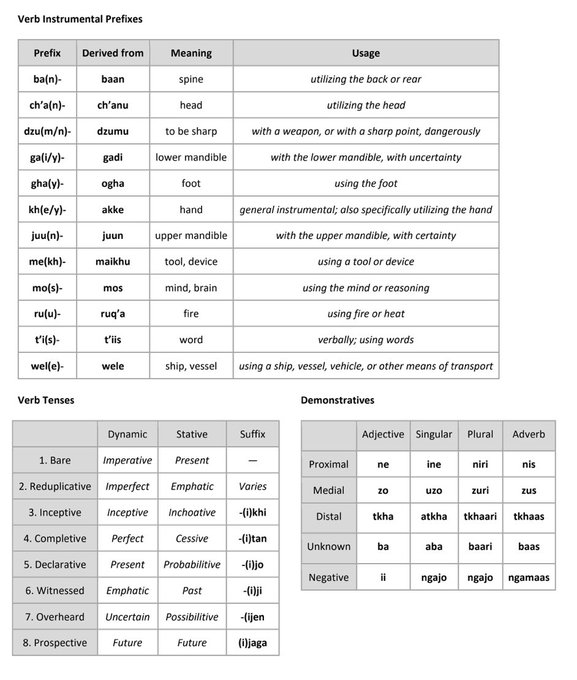Follow up to the last RT, here are some photos of the short
#Sangheili
primer
@tlacamazatl
wrote up. I’ll provide some further explanation.
#conlang
#HaloSeries
11
30
138
Replies
@tlacamazatl
The inclusive/exclusive distinction in the first person plural pronouns (i.e. “we”) signifies a difference between “you and us” vs. “us and not you”. This difference shows up quite a bit in the series, so listen for “riin” vs. “jaari”.
1
1
22
@tlacamazatl
Cases are, in this case, little tags that let you know what role a noun plays in the sentence. Ergative and absolutive are grammatical; vocative is for direct address; the rest are locative. I’ll explain these.
2
1
20
@tlacamazatl
The ergative “o” is placed directly after a noun that effects the action of the verb. For example, in K’uucho o domo ruuk’inatan, “The warrior attacks the human”, k'uucho “warrior” is followed by “o” because it’s the one that causes the attacking to happen. Domo gets no tag.
1
1
16
@tlacamazatl
The locative cases are analogous to the following English prepositions:
Ablative: wele ga “from the ship”
Adessive: wele ni “on the ship”
Allative: wele oni “to the ship”
Elative: wele ba “out of the ship”
Illative: wele zhi “into the ship”
Inessive: wele me “in the ship"
1
1
15
@tlacamazatl
Those familiar with cases may notice there are no possessive cases. This is because one uses various of the other cases for possession depending on the nature of the possessive relationship.
1
1
12
@tlacamazatl
For example, K’uucho oni zhuro would be “the warrior’s weapon”. Presumably this is one the warrior owns. K’uucho ni zhuro would also be “the warrior’s weapon”, but the implication would be it was one they just picked up, or was an improvisational weapon—one they happened to have.
1
2
11
@tlacamazatl
Now, let’s say the warrior has their father’s weapon. You’d probably say something like K’uucho oni nejo ga zhuro. That is, “the weapon FROM the father TO the warrior”.
1
1
11
@tlacamazatl
You can also make fun distinctions like K’uucho me ik’o “the warrior’s eye(s)” (presumably still in there), and k’uucho ba ik’o “the warrior’s eye(s)” (which, regrettably, have been removed for some reason).
1
1
14
@tlacamazatl
There is a distinction between dynamic and stative verbs. The understanding of the tenses will change depending on the type of verb. This should be familiar to English speakers, as we do the same thing. (Cf. “I like pizza”~“I’m liking pizza” vs. “I eat pizza”~“I’m eating pizza”.)
1
1
11
@tlacamazatl
A dynamic verb is one where there has been some actual change in the world—where some action has taken place (e.g. “call”, “crush”, “send”). A stative verb is one that reflects more of an internal state (e.g. “understand”, “be useful”, “forget").
2
1
10
@tlacamazatl
#Sangheili
has 8 tenses, but the meanings of those tenses vary depending on whether the verb is stative or dynamic.
1
2
12
@tlacamazatl
The forms are relatively simple, except for the reduplicative, which enjoys a lot of use. For dynamic verbs, it’s the present tense; for stative verbs, the emphatic.
1
1
9
@tlacamazatl
Here are some examples:
🔹ch'in ~ ch’injin “stab”
🔹naya ~ nenaya “fertilize egg"
🔹opkho ~ pkhaapkho “bend"
🔹pkhungo ~ pkhubungo “sleep"
🔹qkhoso ~ qkhoghoso “walk"
🔹satkha ~ sasatkha “be sure"
🔹tkhop’o ~ tkhaadop’o “name”
🔹zaya ~ zaazaya “expand"
2
2
12
@tlacamazatl
Gave
@tlacamazatl
fits trying to remember what the correct reduplicated forms were… Ugh.
2
1
7
@tlacamazatl
Something that’s missing from these are the question forms. When asking a yes/no question, there are special forms for the verbs used with a reduced set of tenses (4). You’ll hear them when questions are asked.
1
1
9
@tlacamazatl
For example, in the last episode, Make says Jan o tkha q’unqijaga, k’e daaghajahe? “Are you worried I’ll forget?” Before the comma is the “I’ll forget” part. K’e is “you”. Daagha is “worry”, and the -jahe suffix is the one you’ll hear with questions.
1
2
11
@tlacamazatl
(Incidentally, that suffix was my favorite part. Really wanted it. Loved the sound of it. Works well with the regular antepenultimate stress, as stress always falls directly before -jahe.)
3
1
11
@tlacamazatl
Oh, whoops! The reduplicative is the IMPERFECT for dynamic verbs, not the present. My bad! The imperfect is like “I was x’ing”.
1
1
8
@tlacamazatl
The other big table up there has less to do with grammar than the lexicon. The instrumental prefixes are used to derive new verbs from verb bases. It’s a little like how we have verbs like “deduce”, “produce”, “induce”, “adduce”, etc.
1
1
8
@tlacamazatl
A basic verb would be duje “to molt”. From that, we derived the following:
🔹moduje: lose track of
🔹juunduje: make look good
🔹gaiduje: sully
1
2
9
@tlacamazatl
This is khawa “to say”:
🔹gaikhawa: guess
🔹khekhawa: respond
🔹juukhawa: claim
🔹t’ikhawa: chat
1
3
12
@tlacamazatl
If you compare the prefixes and their original meanings plus approximate uses, then combine them with the original verbs, you can get a sense of how we built these words, and came up with meanings for them. It was a lot of fun!
2
2
11
@tlacamazatl
The demonstratives are more or less explicable (this, that, yonder, at an unknown place, nowhere).
1
1
9
@tlacamazatl
But yeah, this is what
@tlacamazatl
and I have been working on and with since April 2019. :) Hope you enjoy it.
#HaloSeries
#Sangheili
#conlang
2
1
15


